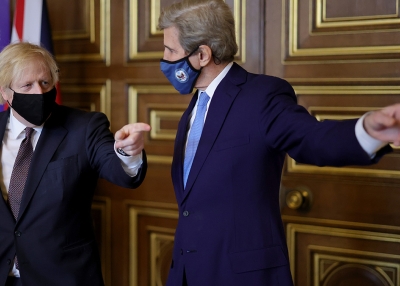Explainer | The Biden Administration and Climate Action
Asia Society Policy Institute non-resident Senior Fellow and former Australian Ambassador for the Environment Patrick Suckling explains how Joe Biden's administration is approaching climate action in the first months of his presidency.
“I think the most important elements of his pre-election commitment was the size of it,” Suckling says. “It was the most ambitious commitments ever made by a presidential candidate, so that in itself was historic. Really, what he was doing was putting climate change at the heart of his agenda, in terms of being voted in.”
Policy goals include: a commitment to net zero emissions by 2050 (in the electricity sector by 2035), USD $2 trillion towards clean energy and renewables, and a strong emphasis on next generation technologies like hydrogen and CCUS (Carbon, Capture, Utilization and Storage).
“It was a very comprehensive package that he talked about, and he got a lot of praise for being so ambitious at the time and that was part of what, I suppose, the excitement around his candidacy.”
The Biden administration has recommitted to international efforts, rejoining the Paris agreement.
“That’s a very significant step,” Suckling says, “because although the world has been moving and is accelerating on climate action, having the US not there was a drag, so he is put a lot more wind back in the sails of the international efforts and sharp on the heels of that he’s announced a summit in April to focus on climate ambition and action. Therefore, he is acting on his campaign commitment to resume US leadership in building and strengthening momentum on climate action and ambition, globally.”
Domestically, Biden has moved on executive actions on a larger emissions reduction target for United States Nationally Determined Contribution, and on leveraging federal purchasing power to advance zero carbon in terms of energy by purchasing electric vehicles.
“He is re-legitimizing climate science and putting it back through the bureaucracy,” Suckling says.
This is confirmed by the creation of a civilian climate corps, and a major focus on climate investment in the forthcoming infrastructure bill.
Internationally, the U.S. will focus on working with other big economies, such as China and India, but it extends to countries like Indonesia and Vietnam.
“China has already committed to a net zero by 2060, or actually before 2060, and in the Paris agreement they have agreed to peaking their emissions by 2030,” Suckling notes, “but they’ve also indicated recently that they’re looking to peak before that and on some estimates, they will peak by 2023 or 2025.”
Australia has also committed to the Paris Agreement, and Suckling notes that climate was included in discussions between Prime Minister Morrison and President Biden.
Suckling suggests that the Australian government will have a renewed focus on climate action. “That has been happening anyway just because of the acceleration of climate action around the world”, he says. “We will definitely need to move further and faster on climate action.”
“I think the Prime Minister gets that,” he says. “There have been all sorts of indications over the past year, but particularly over the last few months, that he is shifting and will continue to shift. I would not be surprised if he announced a net zero by 2050 agenda and announces new measures and arrangements to build assurances that that is not just a statement, its actually activity and policy behind that.”
Climate action will provide opportunity for collaboration between Australia, the U.S. and across the Asian region, in agriculture and infrastructure to name but two areas.
“Certainly, in the broader context of Asia, with Japan having signed to net zero by 2050 and Korea doing the same and China before 2060, the ability for us to work with the United States for advancing that agenda, strengthening relationships across the region, aligning those interests with our strategic interests I think would become a very strong diplomatic lever for us.”
Patrick Suckling is a non-resident Senior Fellow at the Asia Society Policy Institute, former Australian Ambassador for the Environment and a Senior Partner at Pollination, a specialist climate advisory and investment firm.
Asia Society Australia’s Explainer series presents specialists from and on Asia providing expert analysis on the latest news and events to help Australians better understand critical issues affecting the region.
Asia Society Australia acknowledges the support of the Victorian Government.





